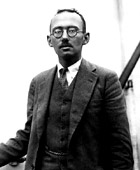Stephen Vincent Benét was born in Bethlehem, Pennsylvania, into an army family. His father, Colonel J. Walker Benét, served as a commanding officer of ordinance posts in California and Georgia. Frances Neill (Rose) Benét, Stephen's mother, was a descendant of an old Kentucky military family. Because his father was an avid reader, Benét grew up in home, where reading literature was valued and enjoyed.
At the age about ten, Benét was sent to the Hitchcock Military Academy. He did not like the brutality of the school and later wrote about it in his poem about Shelley at Eton: "His pile of books scattered about his feet, / Stood Shelley while two others held him fast, / And the clods beat upon him." Benét's first book, FIVE MEN AND POMPEY (1915), a collection of verse, was published when he was 17. It showed the romantic influence of William Morris as well as the influence of modern realism.
Benét was rejected from the army because of his defective vision.
In Washington he worked as a cipher-clerk in the same department as James Thurber. Benét graduated from Yale in 1919, submitting his third volume of poems instead of a thesis. In Yale his contemporaries included Thronton Wilder and Archibald MacLeish.
Benét's first novel, the autobiographical THE BEGINNING OF WISDOM, appeared in 1921. He continued his studies at Sorbonne, France, where he met his wife, the writer Rosemary Carr. In 1923 he returned to the United States. During the 1920s he wrote three other novels, YOUNG PEOPLE'S PRIDE (1922), JEAN HUGUENOT (1923), and SPANISH BAYONET (1926), a historical novel about the 18th-century Florida. It focused on Benét's ancestors. JAMES SHORE'S DAUGHTER (1934), a story about wealth and responsibility, is usually considered among Benét's best novels. .
In 1926 Benét went back to France, where he lived for four years, and worked on his poem about the Civil War, John Brown's Body. It won the Pulitzer Prize in 1929. "So, from a hundred visions, I make one, And out of darkness build my mocking sun." Seen from the perspective of a young, small town boy, it interweaved the stories of historical and fictional figures to produce a richly textured account of the war, from the raid of Harper's Ferry to General Lee's surrender at Appomattox Court House.
Before starting any new work, Benét published a collection of ballads and poems, written over a period of fifteen years. It celebrated American names and people, such as William Sycamore, whose "... father, he was a mountaineer / His fist was a knotty hammer..."
In the 1930s Benét published among others A BOOK OF AMERICANS (1933) with his wife Rosemary Carr Benét. THE BURNING CITY (1936) included the poem 'Litany for Dictatorships'. THE HEADLESS HORSEMAN (1937) was an one-act play. A short story collection, THIRTEEN O'CLOCK (1937), included the famous 'The Devil and Daniel Webster'. The story was later made into a play, and opera (music by Douglas Moore), and a motion picture entitled All That Money Can Buy. Benét also made a number of radio broadcasts and worked in Hollywood as a screenwriter. His short stories, produced during these years, were often written under pressure to pay bills. Benét popular poem, 'American Names', appeared first in BALLADS AND POEMS (1931). The poem ends with the line 'Bury my heart at Wounded Knee'.
In the early 1940s Benét was a strong advocate of America's entry into the war - in the United Nations Day speech President Roosevelt read a prayer specially composed by the author. Benét died in New York City, on March 13, 1943. He was posthumously awarded in 1944 the Pulitzer Prize for his volume of verse WESTERN STAR. The epic poem, part of large but unfinished work, reflected the view that the frontier was the dominant force in American history. |






